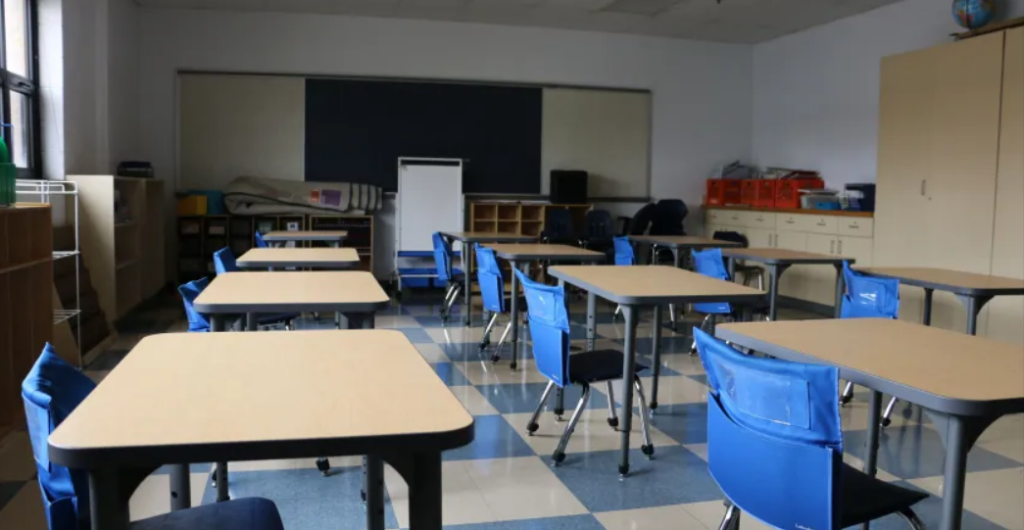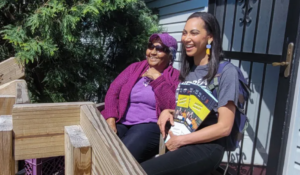What the education panel’s rejection of NYC’s funding formula means for schools

What began Wednesday night as a routine vote by the city’s Panel For Educational Policy ended with concern among principals, union officials, and even the schools chancellor about the potential delay of school budgets and plans for the upcoming school year.
The panel, a mostly appointed board that makes decisions on major contracts and policies, rejected an annual request from the city to approve its 15-year-old school funding formula, which sends more money to schools that are struggling academically, as well as those with higher shares of students with disabilities and English language learners.
The formula accounts for about $10 billion in funding and makes up 65% of a school’s budget, most of which goes toward hiring staff, and the vote could delay school leaders’ ability to build classes for their students next year, said Lindsey Oates, the department’s chief financial officer. Though city officials said they are “committed” to reviewing the formula, Chancellor David Banks called the vote “deeply disappointing.”
The matter may be made moot by a May 18 meeting if all of Mayor Eric Adams’ appointees are present — one of them was absent Wednesday night — or if he appoints a new panel member to replace one he forced to resign in March.
Either way, the controversy highlights longstanding concerns about whether the formula is equitable enough, such as it not providing extra support for students who are homeless. When members of the public raised those concerns, at least one panel member who had planned to vote “yes” abstained instead.
“It was a moral vote in the sense of making sure that we held the city accountable for once again forgetting the most vulnerable students,” said panel member Kaliris Salas-Ramirez, who was appointed by Manhattan Borough President Mark Levine. “We do not in any shape or form want it to impact school communities, and we will definitely do our best to push forward and to have some form of clarity or agreement.”
The panel’s vote is unlikely to have an immediate effect on school budgets, according to a former senior education department official who spoke on condition of anonymity to speak freely. But if the panel does not approve the funding formula at its next meeting in May, or if panel members approve a modified version that requires recalculating school budgets, that could delay principals’ ability to plan and make hiring decisions for next school year since they won’t have a clear sense of their upcoming budgets.
“Do I think it’s the end of the world? No,” the former official said. “Do I think it’s a really bad practice? Yes.”
The mayor appoints nine people, or a majority, to the 15-member board, meaning the administration’s proposals are rarely rejected. However, Adams has failed to replace a minister who was forced to resign after the New York Daily News revealed her anti-gay writing.
Additionally, another mayoral appointee was absent because of a family emergency, according to Gregory Faulkner, panel member and mayoral appointee. That left the administration with seven of the eight votes they needed. While they all voted yes, the members appointed by borough presidents all abstained, and the elected member, Tom Sheppard, voted no.
Wednesday night’s vote stunned some observers. To some, the vote suggested that City Hall and the education department were not paying close enough attention to how PEP members planned to vote — or even ensuring they had filled every vacancy allocated to the mayor.
“Weeks leading into a PEP meeting you had to understand where people were on the issues,” the former education department official said. “Is someone managing this process?”
Still, the former official said: “The likeliest outcome is they commit to the PEP to rethink the funding formula for next year and they bring it back for a vote.”
That’s along the lines of what Salas-Ramirez is hoping for. Ahead of Wednesday’s vote, education department officials briefed the panel members on the funding formula.
Salas-Ramirez said she raised concerns about the formula during her group briefing and in a one-on-one discussion with a department official.
Eventually, Salas-Ramirez felt that Oates and other department officials were frank with her, understood that the formula needs to change, and were committed to reworking it, so she had planned to vote “yes” Wednesday night.
“But then last night, the community outreach was so powerful,” Salas-Ramirez said. “Having so many [Community Education Council] members and folks in the community talking about the inequities in the Fair Student Funding formula for students with disabilities, the limitations that it has in terms of serving marginalized communities, the lack of accountability of students who live below the line of poverty and temporary housing — all of those things really resonated with us.”
Some of the panel members seemed to be swayed by NeQuan McLean, president of the parent council in District 16, who said that he was part of a city task force that spent nine months making recommendations to change the formula that were ultimately not released to the public.
A copy of that draft report, which was never officially released by the de Blasio administration, shows nine recommendations. They include adding new weight to the formula for students living in poverty, are homeless or in foster care, and increasing weight for high schools to match those that have “specialized academic portfolios” — an issue related to how the formula sends money to some higher performing schools, which tend to enroll fewer Black and Hispanic students.
There were no specific recommendations about what the weights should be, but instead suggestions on what steps the city should taske next. Some of the recommendations appeared to have the support of a majority, but not all, task force members.
Members of the panel asked why that report wasn’t released, and some asked to see a copy, including Salas-Ramirez. Faulkner, the mayoral appointee, said in an interview that he’d like a copy, too.
On Wednesday night, Oates, who worked during de Blasio’s tenure, said she “cannot speak to the previous administration’s decision to not release the report,” but noted that the release was planned around when the pandemic hit.
She said the city should discuss how the formula can be improved and that she understands “the frustration” around the task force’s work not being released or enacted upon. But what should also be considered is that the recommendations in the report “would require new resources to pay for [them]” which won’t be an easy lift. Despite this, the city previously addressed one of the biggest criticisms by giving schools all the money they were owed under this formula, following historic increases in state funding and an infusion of federal stimulus dollars.
Salas-Ramirez said she and other borough appointees had no plan to abstain together during the Wednesday vote, and said she abstained instead of voting “no” because she had not discussed the matter with Levine, her appointer. Still, she called the resulting vote “a strategy” to get the city to commit to working on a revamp of the formula.
“What we can do with this vote is take this opportunity to have a formal commitment to make a change by next year,” she said.
Faulkner said he felt fully informed during his briefings. He agrees that there are problems with the formula, but last night felt like the wrong time to vote it down. He also felt “somewhat surprised” by the comments because no one on the panel had raised issues with the formula until Wednesday night.
“I think there are definitely issues with the formula but because it was last-minute, we need to err on the side of, ‘What’s gonna do the least harm?’” Faulkner said. “If this was a bad formula, like, OK, I get it, but do we now put all of the kids in jeopardy?”
It wouldn’t be the first time school budgets would be delayed. Oates said schools received their budgets in July and June in 2020 and 2021, respectively, due to the “extreme fiscal crisis” the city was facing due to the pandemic.
Before the pandemic, schools typically received their budget plans in mid-May, meaning that they knew how much money they would get for the following school year and could begin to make decisions on hiring and how many classes they may need.
Former Washington Heights principal Julie Zuckerman said the delay in her budget last year caused a hiring mess at her school. She was feuding with the education department over an apparent miscalculation, which prevented her from hiring another teacher before the start of the school year — issues that perhaps could have been resolved had her budget come on time.
“It’s a many-tiered situation, and when one little piece goes off, it has a lot of repercussions,” Zuckerman said.
Mark Cannizzaro, head of the city’s principals union, said he doesn’t anticipate a major impact to school budgets if the PEP approves the funding formula at its next meeting but warned of disruptions to school planning if funding uncertainty extends beyond that.
“It’s got to be straightened out at the next meeting,” he said. “The city and the DOE should have made sure this was going to pass prior to the vote.”
Before the vote was cast, Banks said his immediate reaction upon hearing concern from panel members was to table the matter, but it was too late to do that.
“Essentially what we’re saying is that we don’t have time to address it now, which leaves you essentially with no choice as PEP members in how we should be moving forward,” Banks said. “I’m not happy with that process.”
An education department spokesperson declined to say what the city was planning to do next.
This article was originally posted on What the education panel’s rejection of NYC’s funding formula means for schools





